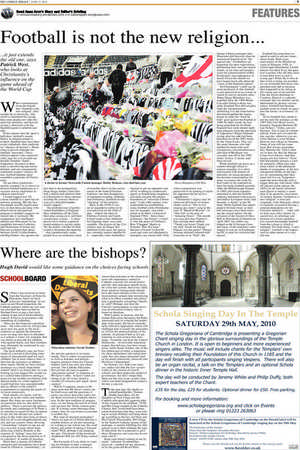Page 9, 11th June 2010
Page 9

Report an error
Noticed an error on this page?If you've noticed an error in this article please click here to report it.
Tags
Share
Related articles
Is Fair Play A Relic Of The Past?
Glimpsing Original Sin In A Cynical Tackle
The Dark Cup Final Of The Soul
Football Academies Are The New Sunday Schools
Football, Athletics, Tennis
Football is not the new religion...
When commentators issue the remark that “football is the new religion”, they usually do so derisively. This cliché is shorthand for saying that some people now take this sport too seriously, and that our society’s obsession with the beautiful game is infantile and silly.
In the manner that the sport is held dear, football’s resemblance to religion-proper is evident. Football fans have their ersatz cathedrals: their stadiums (or “theatres of dreams”). Promising or proven manager are labelled “messiahs”. Onceidolised players who controversially sign for a rival outfit are literally branded “Judas”. Supporters’ devotion to their team is unswerving and unconditional, and can consequently sometimes inspire violence. In this, football fandom often resembles a pastiche of Christianity.
Yet are these similarities merely cosmetic? Is it correct to dismiss football fanaticism as a vacuous and its similarities to religion superficial?
I would suggest not. Of course football as a sport has no intrinsic meaning. But the fact that people ascribe significance to it, in that there are many who afford ethical and spiritual purpose to football, suggests we should take it seriously. (By comparison, less intelligent atheists are often prone to say squabbles between Catholics and Protestants or Sunni and Shia are no better than those between Swift’s Little-Enders and Big-Enders: this ignores the fact that to the protagonists, these things matter.) And football’s ethical and spiritual debt to Christianity is more substantial than the cursory observations of a pub philosopher would suggest.
The misbehaviour of professional footballers in England their infidelities off the field, their play-acting on it, and their conspicuous avarice – is often perceived to mirror a general moral malaise in society today. Yet the public’s dislike of their conduct illustrates the opposite – that, paradoxically, many people have an automatic sense of morality that is in the continuation in the Judea-Christian tradition: one that disapproves of mammon-worship, infidelity and dishonesty. Football reviles “cheating” of all varieties.
Back in the 1970s it was never regarded as taboo to be over-physical on the field of play – indeed the likes of Chelsea, Everton and Leeds United made it their hallmark but feigning injury was unacceptable. The players of the 21st century may no longer feel inhibited in this area, but spectators certainly remain repelled by it – especially when footballers attempt to get an opponent sent off by writhing in synthesised agony or brandishing imaginary red cards towards the referee. Exponents of “muscular Christianity” in the 19th century were responsible for establishing many football clubs (Southampton, for example, was established in St Mary’s Church of England YMA – hence their nickname, “the Saints”), which is why the antics of Chelsea’s Ron “Chopper” Harris or Norman “Bite Yer Legs” Hunters of Leeds United 40 years ago were not adjudged to transgress any moral code. Only when a perpetrator was perceived to be seeking to injure his opponent did he receive opprobrium.
Christianity’s legacy may be observed obviously in terrace chants such as “You’re not singing any more”, sung to the tune of “Bread of Heaven”, or “One-Nil” to the tune of “Amazing Grace”. This month you may also hear Nigeria’s fans reciting their anthem “Thank you Jesus/ Thank you my lord, Thank for letting/ Nigeria win the game!” Players become idolised, referred halfironically to as “God”; the former Chelsea manager Jose Mourinho did likewise when he announced himself to be “the special one”. Footballers are legendary for their superstition, performing their own pre-match rituals, as are fans and pundits: since the announcement of Rio Ferdinand’s non-appearance in South Africa this month we have heard much talk about the “curse of the England captain”.
Yet Christianity”s debt can be more profound, in that football is also perceived as an avenue in which to convey morality tales. When Diego Maradona was expelled from the 1994 World Cup after failing a drugs test, many England fans derived glee from the announcement, attributing it to the same hubris that had propelled the Argentinean to make his “hand of God” goal against the English in 1986. In other words, he was being punished for his Pride. England fans took similar righteous pleasure from the spectacle of Argentina’s Diego Simeone crying after his side had been knocked out of the 2002 finals by the Three Lions. This was the same Simeone who had nodded his head with such conspicuous sanctimoniousness after David Beckham was crucially sent off in the 1998 finals. Justice, it seems, had been served.
While football can serve as a conduit through which to express morality, it is often intertwined with matters of mortality. In recent decades it has become commonplace for many to express the wish for their ashes to be scattered on their favourite football grounds. After the Hillsborough disaster of 1989, television reporters reminded us that the Anfield stadium, festooned with scarves and replica Liverpool shirts, had become “a shrine” to the 96 dead. While football fans appropriate Christian ritual, so football talismans have been entering the sacred sphere. On the occasion of the funeral of Alan Ball in Winchester Cathedral on April 2007, his coffin was draped in the St George Cross and many of the mourners came draped in scarves of Southampton FC,a team for which he had played. Football has long been coopted to seek to answer issues about death. With every anniversary of the Munich air crash of February 1958, in which eight Manchester United players lost their lives, the question is posed: why did they have to lose their lives at such a young age? When the events of that awful evening are recalled, we are reminded that those who perished only did so because they happened to be sitting in the wrong part of the aircraft. Like the recent shootings in Cumbria, Munich is a ghastly reminder that our demise can be determined by prosaic circumstance. Football has become another arena in which we question the nature, or existence, of fate.
Yet to football fans, death is not the end. For instance, in the 1987 film Full Metal Jacket, Gunnery Sergeant Hartman (R Lee Ermey): “Today, you are Marines. You’re part of a brotherhood. From now on until the day you die, wherever you are, every Marine is your brother. Most of you will go to Vietnam. Some of you will not come back. But always remember this: Marines die. That’s what we’re here for. But the Marine Corps lives forever. And that means you live forever.” Football aficionados possess a similar mentality. Often fans take some solace in the premature deaths of youngsters, or the less unexpected deaths of old players, by maintaining that their team will live on. Supporters make the point that the club is bigger than any individual. After all, players come and go, the club is to all intents immortal each player is merely a custodian of an apostolic succession. To merely dismiss “football as a new religion” is trite and simplistic. Like Marxism, which is routinely accused of having a comical dependence on the Christian narrative — what with its holy man with a beard, its sacred text, its teleology and promise of a future paradise you cannot disentangle football from the culture in which it emerged. Far from being “a new religion”, football is the expression by other means of a very old one.
blog comments powered by Disqus





















